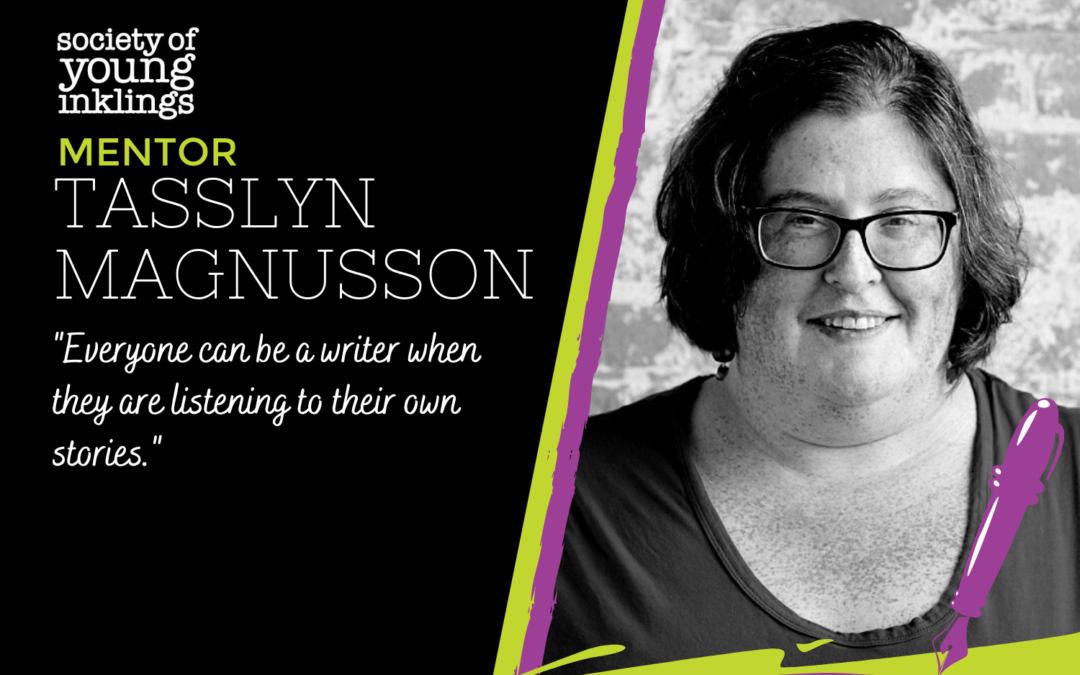As a fourth grader, Tasslyn Magnusson once tried to read her school library from A to Z, backward. She got stuck on P. L. Travers and Mary Poppins and has been reading anything and everything since. When she’s not writing her poetry or working on her middle grade novels, she’s reading fan fiction written by her teens and trading book recommendations with their friends. Tasslyn received her MFA in Writing for Children and Young Adults from Hamline University in January 2017. She has had several poems published and won the 2017 Room Magazine Poetry prize.
Tell us about when you first knew you were a writer.
I knew I was a writer when I got my first journal – I was at an education conference with my mom and she bought me a blank book. I was 7. I went to writing camps and did writing contests and did literary magazines. But as I got older, I got a little lost along the way – lots of folks tell kids they can’t be writers because “there’s no money in it” or “you’ve got to find a real job” or “what else are you going to do?” I let all kinds of messages get into my head and didn’t return to writing until I was 40. And then it was like I found my breath again. People get confused – being a writer is something you are – being an author is the job part of it. But everyone can be a writer when they are listening to their own stories.
What’s something you have learned while mentoring youth writers?
I’ve learned to be brave. My mentees are willing and ready to try anything. One of mine is a poet. I said – let’s try a sestina. She said she liked challenges. She didn’t blink. Next week – presented me with a sestina. They are like sponges – just want to write, talk writing, and learn more about writing. No fear!
I’ve also learned that my inner poet – or my writing gut is often right. Most of the time the mentees already have a sense of what to do and how to do it – they just don’t have all the language that explains it. But they know. I’m just there to help name the tools they’re already using.
Tell us a story about a time when you and a mentee used a strategy or tool and it unlocked new possibilities in their work.
I’ll often have mentees play with poetic form – haiku and acrostics. Especially when they get stuck. When we focus on the structure, I explain, it gives our brains permission to play. So sometimes I’ll say – no more writing on your story until you write an acrostic every day! Just like stretching, it gets your brain in the mood to play – which is the best kind of writing.
Beyond writing books, what is another way you express your creative voice?
I like to cook and I’ve been known to play with clay and draw and even paint. Somebody told me a lot time ago, that when you are playing, you are writing. However that play looks. That practicing being creative, even when it isn’t that great, is part of learning to hear your inner voice.
What are you working on now in your own writing?
I’ve got a YA novel I’m finishing a draft of – it’s a novel that has wanted to be a lot of different forms. First it was free verse. Then I put it all into acrostic poetry because I was interested in secrets you could share in the text. Now I’m moving it into prose. And everything is falling into place. Sometimes it takes stories a while to find their form. I can get impatient – but when I trust my inner writer and be brave, magic things happen.
I’ve also got a few poetry projects in the works. I’m writing a series of “found poems” using language from people talking about the Cleveland Baseball Team – I’m really interested in questions of memory, identity, and race in public spaces.
We each have stories to tell.
Plus, our own unique ways of telling them.
That’s why we personalize each mentorship at Society of Young Inklings. Our mentors are professional writers, storytellers, and illustrators who help students understand how they think, learn, and best achieve momentum. Our mentorships are designed for writers ages 8+ who are ready for a challenge.


